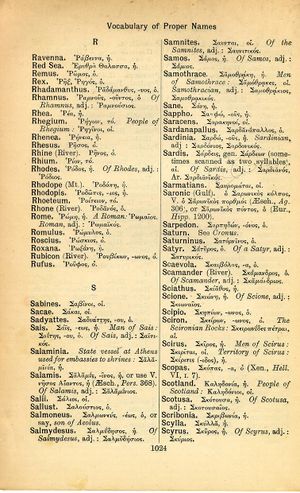Rhamnus
θεὸς δ' ἁμαρτάνουσιν οὐ παρίσταται → God doesn't stand by those who do wrong → A peccatore sese numen segregat → Ein Gott steht denen, die da freveln, niemals bei
English > Greek (Woodhouse)
Ῥαμνοῦς, -οῦντος, ὁ.
Of Rhamnus, adj.: Ῥαμνούσιος.
Latin > English (Lewis & Short)
Rhamnūs: untis, f., = Ῥαμνοῦς,>
I the northernmost town of Attica, famed for an ancient temple of Themis, and in later times for a statue of Nemesis, the mod. Ovriokastro, Plin. 4, 7, 11, § 24; 36, 5, 4, § 17; Luc. 5, 233.— Hence,
1 Rhamnūsĭus, a, um, adj., Rhamnusian Rhamnusium se aiebat esse, from Rhamnus, Ter. And. 5, 4, 27: Antiphon, Cic. Brut. 12, 47: virgo, i. e. Nemesis, Cat. 66, 71; also called dea, Claud. B. Get. 631; and simply Rhamnūsia, ae, f., Ov. M. 3, 406; id. Tr. 5, 8, 9; Stat S. 3, 5, 5. —
2 Rhamnūsis, ĭdis, f., the Rhamnusian goddess, i. e. Nemesis, Ov. M. 14, 694.

